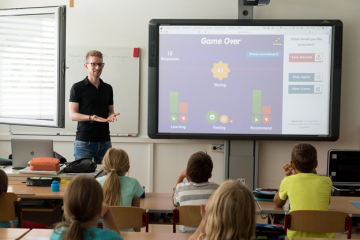 It is interesting to watch our little one’s vocabulary change and evolve as they grow up. Their one word interactions gradually become simple sentences, and the next thing we know we are having conversations with them. In her article For the Love of Words, Susan Canizares writes, “Children who acquire a substantial vocabulary are often able to think more deeply, express themselves better, and learn new things more quickly. They are also very likely to be successful not only learning to read, but also in reading at or above grade level throughout their school years.” Since a good vocabulary is so critical, Red Apple Reading would like to offer some ways you can help build your child’s vocabulary.
It is interesting to watch our little one’s vocabulary change and evolve as they grow up. Their one word interactions gradually become simple sentences, and the next thing we know we are having conversations with them. In her article For the Love of Words, Susan Canizares writes, “Children who acquire a substantial vocabulary are often able to think more deeply, express themselves better, and learn new things more quickly. They are also very likely to be successful not only learning to read, but also in reading at or above grade level throughout their school years.” Since a good vocabulary is so critical, Red Apple Reading would like to offer some ways you can help build your child’s vocabulary.
Be Playful
One easy way to build your kiddo’s vocabulary is through everyday play. When we playfully engage with our children, we are not just spending quality time with them (which is very important), we are helping to build their vocabularies as well. For instance, a simple game of twenty questions is a great opportunity to use interesting words. Have your youngster think of an object; then instead of asking if the object is “big“, ask if it is “huge” or “gigantic”. A fun game of “I Spy” during a car ride is also a good chance to enhance vocabulary. School age children will enjoy doing “Mad Libs” – where you fill in story blanks with adjectives, nouns, adverbs, etc. As you can see, almost any playful interaction you have with your child can actually do “double duty” as word practice. Just make sure that while you are having fun to also be intentional with your use of language!
Be Curious
Parents can also help build their child’s vocabulary by simply being curious. When we ask our kids questions, it gives them the chance to express themselves verbally. However, we often fall into the habit of asking basic “yes” or “no” questions. For example, we may ask, “Did you have a good day at school today?”; instead of , “Describe your day to me.”. The second question encourages the child to express herself in a more meaningful way than the first question does. We can also ask our little ones for alternative words. When your son observes that the clouds in the sky are “fluffy”, see how many words the two of you can come up with that are similar to “fluffy”- such as “feathery” or “soft”.
Be a Reader
Here’s reason #127 to read to your kiddo: it will enlarge their vocabulary! If a child never hears a word, he will never say that word. Reading aloud to our kids and encouraging them to read as they grow older will expose them to hundreds of new and interesting words. So resist the temptation to skip that bedtime story tonight – the payback your child will receive is priceless!
By employing a few simple strategies, you can help your kid increase her vocabulary and thus, positively impact her whole education. Words truly empower!


